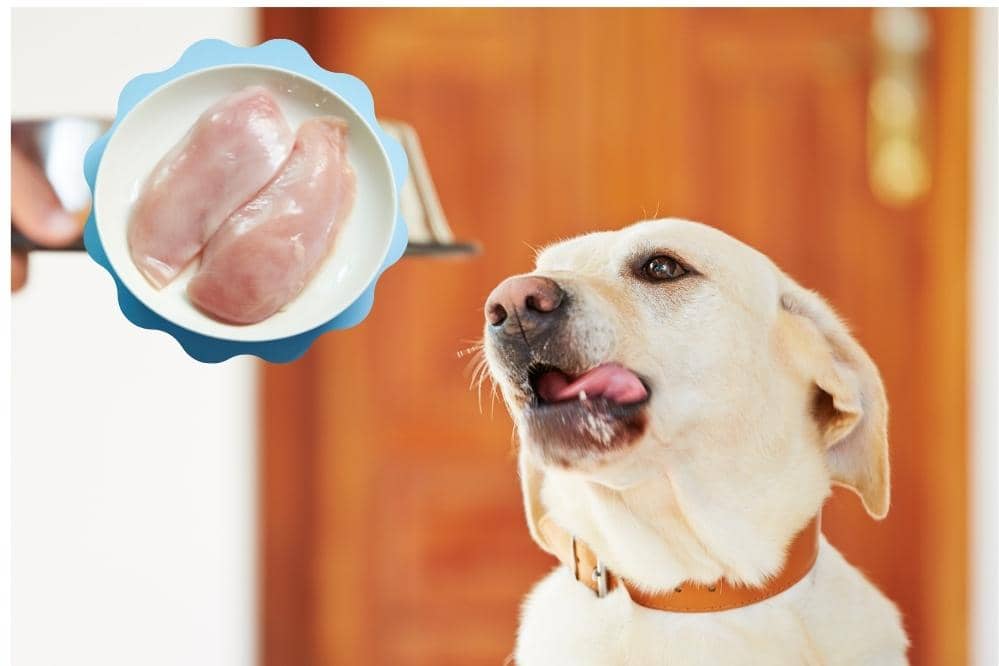If you have ever read the composition of different food brands, you may have noticed that chicken is a primary ingredient in all feed formulations made for dogs. As far as “Chicken breast” is concerned, YES, chicken breast is good for dogs; in fact, it is the preferred cut from the chicken’s body to feed a dog. Chicken breast is a popular, readily available, relatively cheap, and easy-to-prepare type of meat that your canine friend will enjoy eating and will always ask for more. Let’s see how chicken breast is beneficial for our canine friends?
How Feeding Chicken Breast Is Good For Dogs?
Chicken breast is relatively less juicy than other parts of a chicken, but it is unquestionably the healthiest. It is preferred because it is a safe and rich protein source, has less fat, and has an adequate amount of other essential nutrients like vitamins, minerals, and fatty acids. We all know that protein is required for many vital bodily functions (like muscle development and repair, bone regeneration, joint and coat health, etc.). Another important benefit is that chicken breasts are highly palatable and can easily be fed with a regular diet. Chicken breast is considered healthier because it contains protein and fat in 80:20 ratio, a healthy combination that can be fed to any dog without hesitation. Every time your canine friend develops abdominal discomfort or diarrhea, your vet will advise you to feed a blended diet (a mixture of boiled rice and chicken breast).
Let’s quickly look at the nutritional composition of chicken breast meat.
Nutritional Value Of Chicken Breast
According to USDA Food Data Central, the following table shows the nutritional facts of 100 grams of breast chicken (without skin and bones).
| Nutrient | Amount/100g |
| Water | 65.3g |
| Protein | 32.1g |
| Fat | 3.2g |
| Potassium | 33mg |
What Amount of Chicken Breast Is Good For a Dog to Eat?
The amount of chicken breast a dog should eat daily depends on the size, age, weight, and activity level of a dog. Heavier and highly active dogs need more meat to fulfill their energy requirements. However, per WSAVA (World Small Animal Veterinary Association) standards, if you are feeding a high-quality commercial diet, then treats (in the form of chicken or something else) should make a maximum of 10 % of daily energy requirements. However, to simplify things, you can feed chicken breast to your canine friend, from one to three percent of his live weight. Some breeders also follow a thumb rule of 1/3rd cup of boiled chicken breast for every 20 pounds of dog’s weight.
So we recommend you take advice from your vet about how much chicken breast you can feed your furry friend.
Limitations
Despite all the benefits of Chicken breast, there are certain things that you must keep in mind. Let’s discuss these points briefly.
1) Although chicken breast is rich in protein and other nutrients, it’s not a complete diet. So don’t consider it an alternative to a well-balanced commercial diet. According to AFCO (The Association of American Feed Control Officials), two cups of boiled chicken breast can fulfill the energy requirements of a 16-19 pounds dog. Still, this amount will not provide a sufficient amount of many other essential nutrients (like Folate, Riboflavin, Thiamin, Vitamin A, Vitamin B-12, Vitamin E, Vitamin D, Calcium, Chloride, Copper, Iodine, Iron, Manganese, Potassium, and Zinc.).
2) Some dog breeds are allergic to poultry birds, so the chicken breast is not for them.
3) Chicken breast is highly palatable and tasty, and dogs quickly adapt to it. So if you feed too much chicken breast, dogs may develop a strong preference for chicken meat and refuse to eat anything else.
4) Never try to feed chicken breast in raw form because raw chicken may carry many bacteria (like salmonella) that can badly affect your dog’s health, and raw chicken is difficult for a dog to digest. Thorough cooking is necessary to kill bacteria and make chicken breast healthy and easily digestible for your canine friend.
5) While preparing chicken breast for your dog, don’t add any seasoning like salt, spices, onion, garlic, etc., and offer plain chicken only.
6) Never forget to remove bones before presenting chicken breast to your dog because chicken bones are soft, so can splinter easily, and can puncture the stomach or intestinal wall, or cause choking.
Conclusion
From the above discussion, we can conclude that chicken breast is definitely good for dogs; it is the most nutritious and healthiest part of the chicken body. But it is deficient in certain nutrients too. So always feed along with a regular diet and never forget to cook appropriately before presenting to your furry friend.

